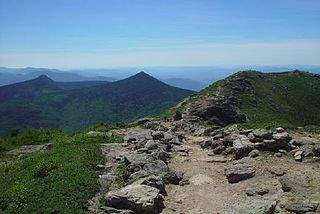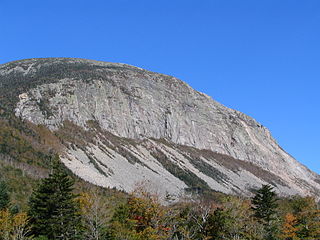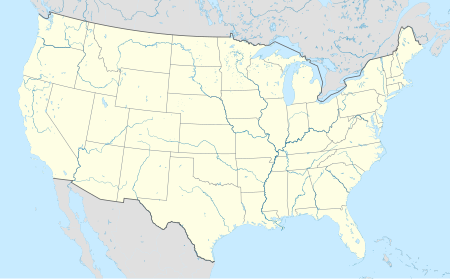
Franconia is a town in Grafton County, New Hampshire, United States. The population was 1,083 at the 2020 census. Set in the White Mountains, Franconia is home to the northern half of Franconia Notch State Park. Parts of the White Mountain National Forest are in the eastern and southern portions of the town. The Appalachian Trail crosses the town.

The White Mountains are a mountain range covering about a quarter of the state of New Hampshire and a small portion of western Maine in the United States. They are part of the northern Appalachian Mountains and the most rugged mountains in New England. The range is heavily visited due to its proximity to Boston, New York City, and Montreal.

Franconia Notch State Park is a public recreation area and nature preserve that straddles eight miles (13 km) of Interstate 93 as it passes through Franconia Notch, a mountain pass between the Kinsman Range and Franconia Range in the White Mountains of northern New Hampshire, United States. The northern part of the park, including Cannon Mountain and Echo and Profile lakes, is in the town of Franconia, and the southern part, including Lonesome Lake and the Flume, is in Lincoln. Attractions in the state park include the Flume Gorge and visitor center, the Old Man of the Mountain historical site, fishing in Echo Lake and Profile Lake, and miles of hiking, biking and ski trails.

Cannon Mountain is a 4,080-foot (1,240 m) peak in the White Mountains of New Hampshire. It is known for both its technical rock and ice climbing on its cliff face and skiing at Cannon Mountain Ski Area. It was also home to the Old Man of the Mountain, until that formation collapsed on May 3, 2003.

Cannon Mountain Ski Area is a state-owned ski resort located on Cannon Mountain in the White Mountains of New Hampshire, United States. Cannon is located within Franconia Notch State Park and offers 10 lifts servicing 265 acres (1.07 km2) of skiing. Cannon has 23 miles (37 km) of trails and a north-northeast exposure and has the only aerial tram in New Hampshire. Cannon has the most vertical of any ski area in New Hampshire, 2,180 feet (660 m), and is the seventh largest in New England. US Olympic skier Bode Miller grew up skiing at Cannon.

The Western Colorado Mountaineers are the athletic teams that represent Western Colorado University, located in Gunnison, Colorado, in NCAA Division II intercollegiate sports. The Mountaineers compete as members of the Rocky Mountain Athletic Conference for all 11 varsity sports.

Selden J. Hannah was an intercollegiate, US F.I.S. and seniors ski champion who became one of the nation's most prolific ski-area architects. He was enshrined in the National Ski Hall of Fame in Ishpeming, Michigan, in 1968. His legacy remains throughout New England and North America in more than 250 ski areas with which he was associated during his lifetime.

The 1955 NCAA Skiing Championships were contested in Northfield, Vermont at the second annual NCAA-sanctioned ski tournament to determine the individual and team national champions of men's collegiate alpine skiing, cross-country skiing, and ski jumping in the United States.

The 1958 NCAA Skiing Championships were contested at the Dartmouth Skiway in Lyme, New Hampshire at the fifth annual NCAA-sanctioned ski tournament to determine the individual and team national champions of men's collegiate alpine skiing, cross-country skiing, and ski jumping in the United States.

The 1964 NCAA Skiing Championships were contested at the Cannon Mountain Ski Area in Franconia Notch, New Hampshire at the eleventh annual NCAA-sanctioned ski tournament to determine the individual and team national champions of men's collegiate alpine skiing, cross-country skiing, and ski jumping in the United States.

The 1970 NCAA Skiing Championships were contested at the Cannon Mountain Ski Area in Franconia, New Hampshire, at the seventeenth annual NCAA-sanctioned ski tournament to determine the individual and team national champions of men's collegiate alpine skiing, cross-country skiing, and ski jumping in the United States.

The 1971 NCAA Skiing Championships were contested at Terry Peak ski area in Lead, South Dakota, at the 18th annual NCAA-sanctioned ski tournament to determine the individual and team national champions of men's collegiate alpine skiing, cross-country skiing, and ski jumping in the United States.

The 2017 NCAA Skiing Championships took place from March 8 to March 11 in Franconia, New Hampshire at the Cannon Mountain Ski Area. The tournament went into its 64th consecutive NCAA Skiing Championships, and featured twenty-one teams across all divisions.

The 1984 NCAA Skiing Championships were contested at the Wildcat Mountain Ski Area in Jackson, New Hampshire as part of the 31st annual NCAA-sanctioned ski tournament to determine the individual and team national champions of men's and women's collegiate slalom skiing and cross-country skiing in the United States.

The 1992 NCAA Skiing Championships were contested at the Wildcat Mountain Ski Area in Jackson, New Hampshire as the 39th annual NCAA-sanctioned ski tournament to determine the individual and team national champions of men's and women's collegiate slalom and cross-country skiing in the United States.

The 1995 NCAA Skiing Championships were contested at the Wildcat Mountain Ski Area in Jackson, New Hampshire as the 42nd annual NCAA-sanctioned ski tournament to determine the individual and team national champions of men's and women's collegiate slalom and cross-country skiing in the United States.

The 2003 NCAA Skiing Championships were contested at the Dartmouth Skiway in Lyme, New Hampshire as part of the 50th annual NCAA-sanctioned ski tournament to determine the individual and team national champions of men's and women's collegiate slalom and cross-country skiing in the United States.

The 2007 NCAA Skiing Championships were contested at the Wildcat Mountain Ski Area in Jackson, New Hampshire as part of the 54th annual NCAA-sanctioned ski tournament to determine the individual and team national champions of men's and women's collegiate slalom and cross-country skiing in the United States.

The 2021 NCAA Skiing Championships took place from March 10 to March 13 in New Hampshire, at Jackson Nordic Ski Area, which hosted the cross-country events, and Cannon Mountain Ski Area, which hosted the alpine events. The tournament went into its 67th consecutive NCAA Skiing Championships, and featured seventeen teams across all divisions.











